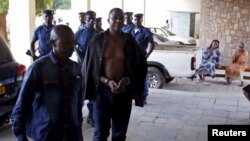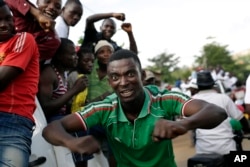Burundi’s government arrested at least 17 people Saturday in connection with a failed coup attempt to overthrow the country's president a day earlier.
The arrests included at least three generals and two police commissioners. A presidential spokesman told VOA's Gabe Joselow that the leader of the coup attempt, General Godefroid Niyombare, remained at large.
Also Saturday, about 100 demonstrators in the east African nation’s capital of Bujumbura protested President Pierre Nkurunziza’s decision to seek a third term.
In a radio address Friday, Nkurunziza had warned against further demonstrations. Since his announcement three weeks ago that he’d seek re-election, violent protests have left at least 14 people dead and more than 200 wounded. He took office in 2005.
Nkurunziza had been in Tanzania for a regional summit on Burundi's political situation when Niyombare announced the coup attempt Wednesday, triggering two days of violence between rival army factions.
In his radio address, the president thanked his security forces for stopping the military coup against the government. He spoke after returning to the capital, where thousands of supporters lined the streets and cheered his motorcade.
U.S. condemns violence
The U.S. State Department late Friday called for Nkurunziza "to condemn and stop the use of violence by the police and the ruling party's Imbonerakure youth militias against those who participated in protests against a third term."
State Department spokesman Jeff Rathke said "individuals who perpetrate or incite violence or exact retribution against those who oppose a third term should be held accountable." Rathke said the U.S. was taking steps to restrict visas for those responsible for violence.
Earlier Friday, the U.S. also advised Nkurunziza against seeking re-election.
"In the interest of stability in the country, in the interest of moving Burundi forward … we have encouraged that the president not pursue a third term," U.S. Assistant Secretary of State Linda Thomas-Greenfield told VOA.
Critics of the president say a third term would be unconstitutional. Nkurunziza and his supporters argue it’s permitted because he was elected by parliament, not voters, for his first term in 2005. Burundi's constitutional court has sided with the president.
Revenge attacks feared
U.N. Secretary-General Ban Ki-moon expressed concern Friday about possible revenge attacks following the failed coup. A spokesman for Ban said the U.N. chief spoke by phone with Kenyan President Uhuru Kenyatta to mobilize regional leaders to help end the crisis. He said Ban also expects to speak with Nkurunziza in the coming days.
The United Nations says more than 105,000 people have fled from Burundi to Tanzania, Rwanda, and the Democratic Republic of the Congo since Burundi's unrest began three weeks ago.
A spokeswoman for the U.N. refugee agency, Karin de Gruijl, said the living conditions for those fleeing have been dire in some areas. She said that more than 50,000 Burundians are now living on the shore of Lake Tanganyika, on the border with Tanzania, and that the lack of clean drinking water, latrines and shelter there is acute.
State Department correspondent Pam Dockins contributed to this report.











